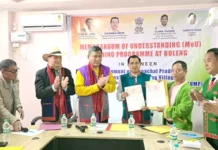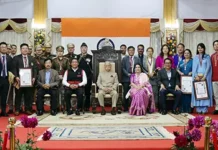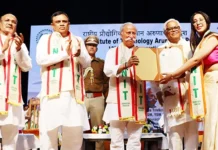[ Maga Neru ]
Are we really asking for accountability from the right person? The public are outraged and demanding justice, and now the person who assaulted the doctors is being condemned by literate and educated people. On the other hand, the doctors and nurses of TRIHMS Naharlagun are being blamed and even called murderers on social media. Social media is flooded with hate comments against the doctors and nurses. The online space is full of hate against doctors, nurses, and hospital staff. Only a few are supporting the medical fraternity.
While some are supporting them, most people are forgetting where the real responsibility lies.
In any family or institution, when a mishap occurs, the responsibility and accountability ultimately lie with the father of the family or the head of the institution. In the case of Tomo Riba Institute of Health and Medical Sciences (TRIHMS), the director should take accountability for the ongoing issues, including widespread dissatisfaction, mismanagement, and eroded public trust that have severely compromised the integrity of this leading health institution. However, a key question arises: Do we even have a competent director in place, when his own position is under scrutiny for unlawfully holding his position since his official retirement on 31 August, 2021, in direct violation of the state government’s 2015 notification banning service extensions beyond the retirement age?
Dr Moji Jini has never come forward for a press briefing to assume the responsibility entrusted to him by the state government.
On a broader note, in a democratic country, the government, especially the health minister, is responsible for ensuring that healthcare functions properly. In the case of Arunachal Pradesh as a whole, and particularly in the ongoing TRIHMS crisis, both the public and the medical staff are suffering. As a matter of fact, both parties are victims of a failed system, and many are forgetting where the real responsibility lies.
The public must know how to hold power accountable and save lives, as in a democratic country, the government, especially the health minister, is held accountable when something goes wrong in his department/ministry because the Health Ministry is responsible for ensuring that healthcare functions effectively. While both the public and medical staffers are suffering, very few are questioning or holding accountable the system that fails to provide enough staff and support at the TRIHMS, due to which the ongoing clash between the common public and medical fraternity is at its peak.
If we see the ratio between patients and doctors, India has around 1 doctor for every 811 to 836 people, which somehow meets the WHO standard of 1 doctor per 1,000 people, but this is just an average. When it comes to states like Arunachal, it is much harder. In recent years, the state has reduced the shortage of general doctors from 33% to 6% but there are still big gaps in specialists and nurses.
The double burden of the nurses and shortage of nurses as well as doctors overburden the medical staff at the TRIHMS. A single doctor handling 800+ patients in such a situation – how can we expect doctors and nurses to smile and give their full attention while handling so many patients every day? At the same time, it is also hard for patients and families who are going through pain and emotional stress. So, expecting them to behave properly, calmly and act appropriately in such a situation may not be entirely reasonable.
Blaming each other won’t solve anything. Instead of fighting or blaming each other, both the public and the medical fraternity should come together and ask the government to fix these problems. We need a peaceful and practical solution – one that supports both patients and healthcare workers.
Know that without proper accountability, power becomes a cycle of repeated failure. When we don’t hold the right person accountable, the mistakes will keep happening again and again.
God bless Arunachal! (The contributor is a research scholar in the sociology department of RGU, Rono Hills)



